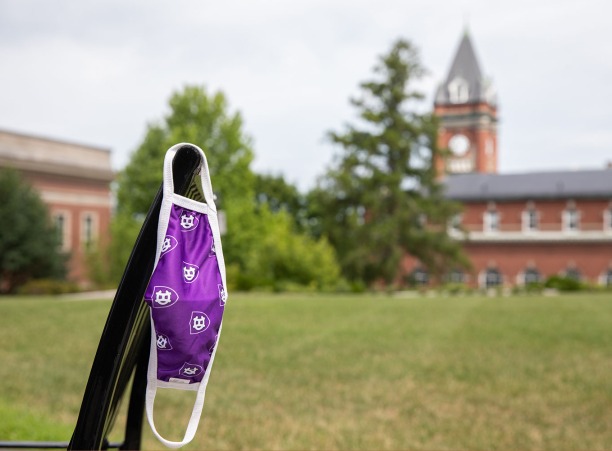
In the midst of the disruption brought on by the COVID-19 pandemic this past spring, while many of his peers were still grappling with the challenges of a sudden shift to remote learning, John Larsen '22 had something else on his mind. He felt strongly that, during this challenging and pivotal time in our history, it was important to preserve the memories of those in the Holy Cross community who lived through this pandemic.
So he teamed up with Lorelle Semley, professor of history and director of the Center for Interdisciplinary Studies, and Cynthia Hooper, associate professor of history and director of the Russian and Eastern European Studies program, in applying for an $18,000 grant from the McFarland Center for Religion, Ethics, and Culture to recruit student research associates to work on this project for the duration of the summer.
Dubbed "COVID Chronicles," the project was structured to have two major goals: to design a website, intended to collect testimonies, photos or mementos of this time from diverse members of the Holy Cross community, and to complete individual research projects around larger COVID-related themes, each involving the compilation of interviews and collection of primary sources.
"The 'COVID Chronicles' project demonstrates a crucial example of student initiative and perspective in the form of a graduate-level research opportunity," said Semley. "It's so important to create and highlight these types of research opportunities that derive from students' own interests and also serve the larger community in a time that is so shaped by use of technology and social media."
Indeed, the student response was overwhelmingly positive, with 26 applications for the 12 approved research associate positions. According to Professor Hooper, the project felt important to students because they were "very aware that we are living through a transformational moment – a period of weeks or months or years that will become the focus of scholarly analysis in the future, and a time people will be curious about for generations to come. We are all, right here right now, living through history."
The student research project topics were equally varied and complex, including: the experiences of Chinese international students, the role of women, the consequences of the Spanish Flu in Worcester almost exactly a century ago, the effects of the current pandemic on today’s Worcester community, the consequences of the pandemic era for young people and the changing roles of art and technology in this new age, and more.
Titled "Alone Together: Technology's Impact on Social Isolation," Larsen’s research project examined the relationship between isolation, technology and connectivity during the COVID-19 pandemic. As part of his research, Larsen incorporated his own contemporary historical research with oral history interviews he coordinated and conducted.
"In just a short number of days, our world became so small, so quickly," said Larsen, a history and Asian Studies double major. "During this time, people lost their typical patterns and quickly adapted to a world where social media replaced authentic social interaction. This adaptation period was challenging for many, and I believed it was important for me to provide a space for people who felt particularly lonely and isolated during this pandemic."
A history and art history double major, Jinze Mi '23 focused on the experiences of Chinese international students during the pandemic. He interviewed Chinese students in the U.S., mainland China, Hong Kong and Taiwan in the hope that he could "shed a light on family relationships, information flows via mass media and reconfiguration of national pride during this unique time of public health crisis."
Elizabeth Griffin '21 delved into researching the impact of the pandemic on artists and performing arts organizations around the country and explored what the future of performance might look like post-COVID. "The arts industry has lost roughly $10 billion since March, and most performances have been canceled until 2021, so I was prepared for some pretty grim outlooks – that this could be the end of performance," said Griffin, a history and music double major. "But many I talked to were hopeful that a cataclysmic event like the pandemic could finally thrust classical music into the 21st century and make it more accessible and socially conscious."
The COVID-19 crisis and its impact on politics, economics and everyday life is not going away as we head into the fall. According to Semley and Hooper, we will still be in the midst of an epoch-defining historical moment over the course of the coming year, as communities of all sizes try to rebuild and renegotiate the organization of family, work and education.
The two professors hope to continue this project during 2021 and the upcoming academic year. They envision this project as a way of creating community and learning from the experiences of others. The next step is to recruit students to manage the "COVID Chronicles" website and develop strategies to engage website visitors and gather content submissions.
"In the end, the 'COVID Chronicles' project, as a whole, has been of enormous value both in terms of its mission to preserve history and, I think, also in terms of its practice of creating community," said Hooper. "But maybe the most important aspect of this project is that it has encouraged our students not only to think about the impact the pandemic has had on their own lives, but also to appreciate and give voice to the different ways the pandemic has touched people other than themselves."
COVID Chronicles: Student Project Documents On- and Off-Campus Life Amid Pandemic
Student research associates spent their summer collecting oral histories and researching stories emerging from this crisis
Read Time
4 Minutes

